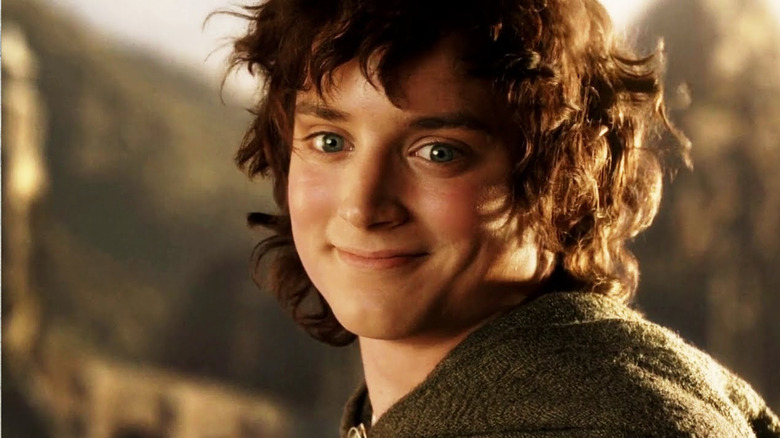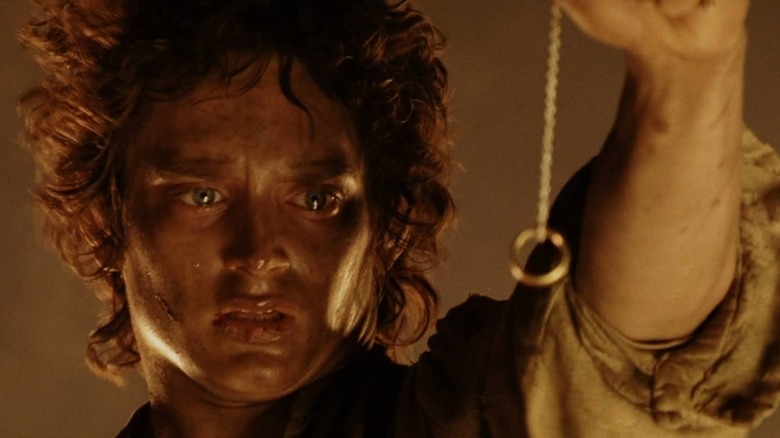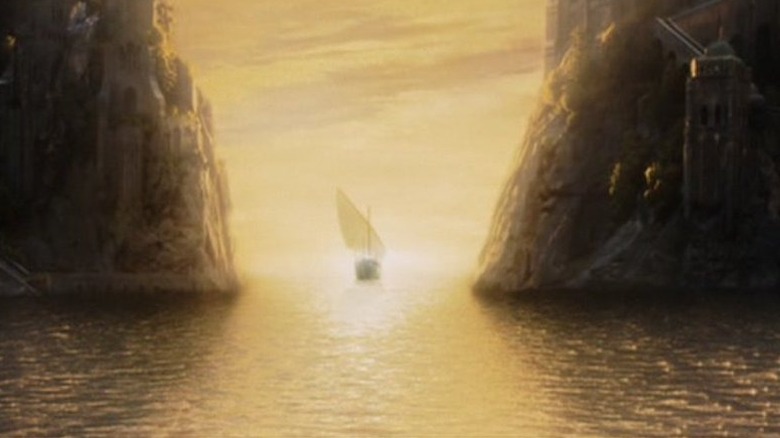Why Frodo Leaves Middle-Earth At The End Of The Lord Of The Rings
The book and movie versions of "The Lord of the Rings: The Return of the King" have a lot of similarities, but also some major differences. Peter Jackson's "Return of the King" adaptation makes some major changes to J.R.R. Tolkien's source material, like cutting out the Scouring of the Shire (the hobbit rebellion to recapture their homeland from Saruman's forces). However, both Tolkien's novel and Jackson's film conclude with Frodo leaving Middle-earth. Why? Other hobbits, like Merry and Pippin, get a less dramatic (though still moving) ending.
So, why does the hero hobbit of Bag End need to leave? Everything's fine, right? The short answer is that Frodo leaves Middle-earth because ... actually, I'll let him explain. Here's how he justifies the move to his beloved Sam in the final pages of Tolkien's book:
"I have been too deeply hurt, Sam. I tried to save the Shire, and it has been saved, but not for me. It must often be so, Sam, when things are in danger: Someone has to give them up, lose them, so that others may keep them."
Earlier, Frodo goes into a little more detail when talking to Gandalf about his "deep hurts." When they pass the Ford of Bruinen (where the Black Riders attacked Frodo early in his quest), Frodo's old wound in his shoulder aches, and Gandalf replies, "Alas! There are some wounds that cannot be wholly cured," to which Frodo responds:
"There is no real going back. Though I may come to the Shire, it will not seem the same; for I shall not be the same. I am wounded with knife, sting, and tooth, and a long burden. Where shall I find rest?"
The answer, of course, is over the seas, in the West, in the Undying Lands. Let's break things down.
Frodo is deeply wounded by the end of the story
Frodo is successful in his quest, but not without a cost. The Black Riders stab him on Weathertop. Later on, he's stabbed in the neck by Shelob, and his body is flooded with her venom. Gollum bites off his finger. Do I need to keep going? Frodo spends the months of his quest going through the ringer.
And this is just the physical side of things. He comes very close to succumbing to the wraith world in the weeks that follow his knife wound. Who knows what kind of demonic menace he faces with Shelob. And let's not forget the One freaking Ring. That thing weighs him down for 17 years in Tolkien's original books before he leaves on his quest, and then only gets heavier as he gets closer to Mount Doom. His mind and spirit are shredded by the experience. Trust me, if you've only seen Jackson's movies, it's hard to grasp the gravity of Frodo's sacrifice. (There's a reason I made the case a couple of years back for why he's the real hero of the story, even if Tolkien technically picked Sam.)
There's a point in "Return of the King," when Frodo and Sam are inching up Mount Doom, where we get a glimpse of Frodo's inner struggle. It's in the movie, but the book version is the best. Here's what Frodo says:
"No taste of food, no feel of water, no sound of wind, no memory of tree or grass or flower, no image of moon or star are left to me. I am naked in the dark, Sam, and there is no veil between me and the wheel of fire. I begin to see it even with my waking eyes, and all else fades."
Frodo going West is a purgatory and a reward
Frodo's experience during the War of the Ring breaks him mentally, spiritually, and physically, to the point where he even gets sick on the anniversary of some of his wounds. But it gets worse.
In a letter to a fan in September 1963, Tolkien explained Frodo's mindset after the One Ring is destroyed. First, he feels relieved, restored to sanity, and close to death. When he survives and is healed, he starts to get restless. Arwen notices first, which is why she gives him her jewel as a source of comfort ... and to put a bug in his ear about potentially going West to find healing. Per Tolkien:
It was not only nightmare memories of past horrors that afflicted him, but also unreasoning self-reproach: he saw himself and all that he done as a broken failure."
When Frodo says that he won't be the same, even if he gets back to the Shire, he's actually reflecting a Dark (Tolkien uses the capital "D") temptation and an inner sense of pride that he isn't returning as a bona fide hero, but rather a mere "instrument of good." There's even a part of him that still desires the One Ring after it's gone. As Tolkien once put it:
Frodo was sent or allowed to pass over Sea to heal him — if that could be done, before he died. He would have eventually to 'pass away' [...] So, he went both to a purgatory and to a reward, for a while: a period of reflection and peace and a gaining of a truer understanding of his position in littleness and in greatness."
In the end, Frodo goes west to heal, learn his place, and receive a slight reprieve from his long labors.


